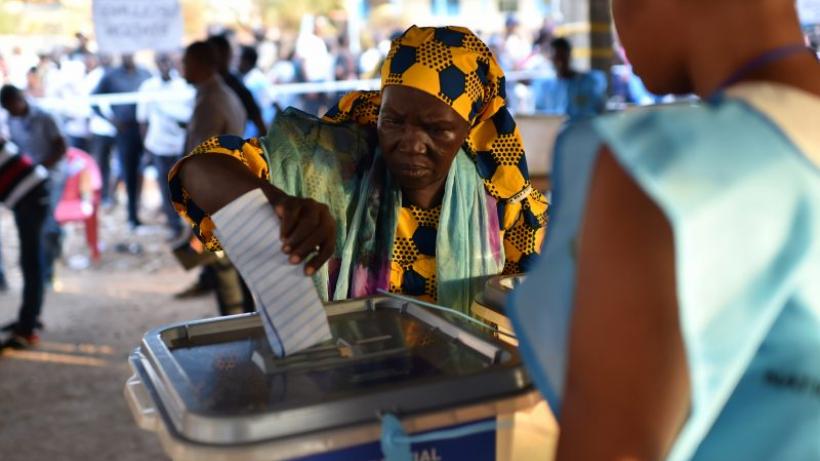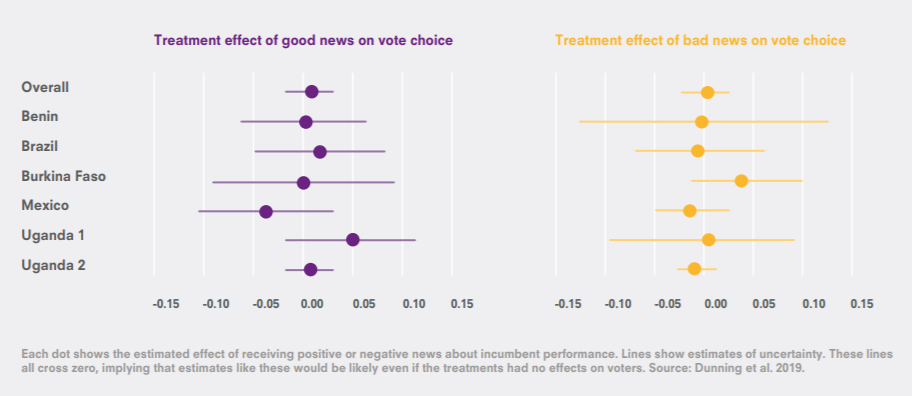
Information and electoral accountability
Do more informed voters elect more qualified candidates? Numerous studies of varying scale and context reveal mixed evidence. Evidence appears stronger for structural interventions and mass communication than for more targeted interventions.
-
IGCJ7744-IGC-Electoral-accountability-WEB.pdf
PDF document • 9.2 MB
Introduction
Democracy is said to give citizens agency, as elections make it possible for them to remove poorly performing politicians. However, this only works if voters know how politicians are performing and are willing to base their vote on this information. This Growth Brief presents evidence on whether providing voters with better information on candidate performance affects their behaviour and strengthens electoral channels to better politician performance. Surprisingly, the evidence on the effects of information campaigns is very mixed.
Elections serve a dual purpose. They are both a periodic opportunity for voters to select good representatives, and a mechanism for incentivising politicians to act in the public interest. Both channels can link elections to better government performance, and ultimately, citizen welfare.
However, both these channels presuppose that voters possess information about the performance of politicians and use it to inform their vote. Hence, many democracy promotion initiatives entail programmes designed to improve the quality of information available to voters. Whether such efforts are effective is of relevance for both research and policy.
Intuitive as it may first appear, the logic linking better information to better political performance is not so straightforward. Indeed, the empirical evidence supporting it is mixed, as presented in this brief.
Key messages
- There are good reasons why more informed voters might not punish poor performing politicians or reward high performing ones. Information may not be believed. If believed, it might not change opinions as many other factors inform voter choice. Politicians react strategically, which can nullify information effects.
- Evidence on the effectiveness of information interventions on voter actions is mixed and weaker than expected. There is a consistently weak effect of providing voters with information in private settings.
- Official information disseminated via media may be especially effective in supporting accountability processes. Information campaigns may be too small to generate effects during electoral campaigns. Larger gains are seen from media interventions.
- Electoral debates may be effective, especially for broadening knowledge about politicians. Debates can affect voter decisions and appear powerful in exposing voters to different candidates. Whether voters reward quality is less clear.
- The effects of information provision are sensitive to local context. New, credible, well-timed information that is salient to voter welfare appear to have the greatest effects. Political context also matters.
Key message 1 – There are good reasons why more informed voters might not punish poor performing politicians or reward high performing ones
There are good reasons why providing information to voters might not result in better representatives or better performance by representatives.
- Information is not believed or absorbed. Voters may dismiss new information if it goes against their beliefs, if they mistrust the source, or if they cannot understand it (Lord et al. 1979, Adida et al. 2019). Information may also lose its bite if neutralised by counterarguments made by political actors (Humphreys and Weinstein 2012).
- Even if believed, information might not change opinions as expected. If voters have strong positions, information might not affect political beliefs (Redlawsk et al. 2010). Furthermore, sometimes voters respond to information in surprising ways. For example, information that a politician has a criminal record could be taken as evidence that they can get things done (Vaishnav 2017). Learning about politicians’ poor performance could produce a broader disillusionment with politics, as seems to have happened in Mexico (Chong et al. 2015).
- Many other factors influence voter choice. Even if information affects beliefs about politician quality, it may have no effects on electoral behaviour if other concerns dominate in voters’ minds: for instance, partisanship, ethnic identity, patronage, or fear (Boas, Hidaldo and Melo 2018, Liaqat et al. 2018).
- Politicians react strategically to information campaigns and can nullify their effects. One response to bad press is to improve performance. But there are many others, for example, investing in vote-buying. In Cruz, Keefer,and Labonne (2018), politicians in the Philippines reacted to voter disappointment over poor performance by stepping up vote-buying activities, neutralising any effect of critical information. Another strategy is to stop information from reaching voters, as happened in India (Chauchard and Sircar 2019), or to time malfeasance with an eye to the electoral cycle (Bobonis et al. 2016).
Overall, while the logic that more information will result in changes in voting behaviour seems plausible at first, there are plenty of reasons why it might not work in practice.
Key message 2 – Evidence on the effectiveness of information interventions on voter actions is mixed and weaker than expected
Many non-governmental organisations (NGOs) and development agencies support projects that seek to produce and disseminate information on politicians’ performance before voters go to the polls, sometimes in partnership with researchers. The evidence for the effectiveness of such pre-election information campaigns on voter behaviour is mixed and generally weaker than observers expect.
Perhaps the strongest evidence for the effectiveness of information interventions comes from Banerjee et al. (2011). By distributing newspapers containing report cards on politicians in Indian slums just prior to elections, the authors found that greater transparency resulted in gains for better performing and relatively more qualified incumbents.
Chong et al. (2015) found evidence that exposing Mexican voters to corruption information – culled from independent audit reports – had a negative effect on votes for the incumbent party. However, due to unexpected effects on voter turnout, it did not translate into gains for challengers.
Humphreys and Weinstein (2012) studied a five year scorecard process in Uganda, which scored politicians on constituency work as well as work in Parliament. The areas that received scorecard dissemination did not re-elect better performing politicians.
A recent initiative involving seven coordinated studies exploring the causal relationship between information and accountability across six countries reports modest effects on voter behaviour, at best (Dunning et al. 2019). The studies – located in Benin, Brazil, Burkina Faso, Mexico, India, and Uganda – coordinated their measurement and estimation strategies, making it possible to pool their results.
As shown in Figure 1, in general the studies found a relatively consistent null effect of directly providing voters with information in private settings, though other variants of the treatment sometimes did produce positive effects in some studies. This is particularly striking because policy area experts, when given details about the interventions, generally expected quite strong effects (Nellis et al. 2019). This surprising lack of impact is possibly due to difficulties of voters to absorb information that has not been sufficiently contextualized (by experts, peers, or pundits).
These weak findings resonate with findings on campaign spending – an area that has received even more scholarly attention and one that involves high levels of investments. Examining results from 49 field experiments, Kalla and Broockman (2019) find that “the best estimate of the effects of campaign contact and advertising on Americans’ candidate choices in general elections is zero.”
Figure 1

Key message 3 – Official information disseminated via media may be especially effective in supporting accountability processes
It is possible that some information campaigns are too small in scale to make much difference during busy electoral campaigns. A better policy might be to focus on the media environment itself. There is evidence that robust media markets can support electoral accountability and facilitate voter sanctioning, especially with respect to malfeasant politicians.
Media revelations of mayoral malfeasance (Ferraz and Finan 2008) and of corruption by Members of Parliament (MPs) (Chang, Golden, and Hill 2010) appear to have reduced the likelihood of incumbent re-election in Brazil and Italy, respectively.
Ferraz and Finan (2008) use the fact that some mayors have audits released before elections, while others have them released after elections. This information was disseminated through media (in this case radio) and had the largest effects where media presence was largest. While striking, it is worth noting that in this case the researchers did not have control over media presence. Therefore, it is possible that the media just happens to be stronger in areas where voters are more sensitive to information.
Other work suggests that as the responsibilities of decentralised governments increase over time, so does the importance of local media for holding local leaders to account (Larreguy, Marshall, and Snyder 2018). Reinikka and Svensson (2005) report, for example, that in Uganda, the share of central government transfers embezzled by local government officials dropped dramatically once local newspapers began publicising the timing and amount of central government transfers to public schools.
Local media coverage has been shown to increase political knowledge and voter turnout in the USA (Snyder and Strömberg 2010, Gentzkow, Shapiro, and Sinkinson 2011) and in Sierra Leone (Casey 2015), where it further facilitates voting across ethnic lines – important ingredients for voters’ ability to hold leaders to account.
However, media can itself be manipulated by politicians in ways that can undo these effects. Boas and Hidalgo (2011), for instance, show that in Brazil, when municipal incumbents exert control over radio stations through licensing, their vote share and winning probability increase significantly. At the cross-country level, there exists a positive and significant correlation between state ownership and incumbent survival rates (Besley and Prat 2006) and a negative correlation between press freedom and corruption (Brunetti and Weder 2003).
The evidence for gains from strong media environments is promising. However, so far, very little of this work benefits from experimental control of media conditions. Even so, research is moving in this direction – Aker et al.(2017) find that randomly distributed newspapers in Mozambique increased turnout and demands made of politicians (although it also increased the incumbents’ vote share). Enríquez et al.(2019) show that social media (Facebook) dissemination at high levels of saturation may also be effective. A next step would be to assess whether there are changes in the types of politicians elected, and the reasons for why media is more effective than other delivery methods, even when disseminating the exact same information.
Key message 4 – Electoral debates may be effective, especially for broadening knowledge about politicians
There is also growing evidence that debates broadcast in the pre-election period provide voters with information that influences their choices. Bidwell, Casey, and Glennerster (2019) found that showing pre-recorded debates between parliamentary candidates in Sierra Leone in the runoff to the 2012 election had positive effects on the general political knowledge of the electorate, as well as their knowledge of candidate qualifications and policy stances.
This knowledge translated into a 3.5 percentage point average increase in vote shares for the candidates who performed best during the debates, as assessed by experts. Critically, the evidence suggests that voters shifted towards candidates with whom they were better aligned (possibly because voters’ views were affected by the debates). Other work also finds that debates can affect voter decisions, although the evidence that voters reward quality is less clear. In studying parliamentary elections in Ghana, Brierley, Kramon and Ofosu (2019) found that debate segments make partisan voters more favourable toward and more likely to vote for opponent party candidates and less likely to vote for co-partisans. However, there is no direct evidence of better alignment of citizens’ votes.
Platas and Raffler (2019) studied public screenings of quasi debates prior to Uganda’s 2016 parliamentary elections and found no evidence that voters shifted votes to candidates with whom they were better aligned. However, they did find evidence that voters started supporting opposition candidates at higher rates, perhaps because they were seen as having greater competence.
Debates may thus be especially powerful in exposing voters to different sorts of candidates. An important area for future research is establishing whether this in turn results in voters selecting politicians that perform better in office.
Key message 5 – The effects of information provision are sensitive to contextual conditions
Multiple studies suggest that the effects of information provision on vote choice are sensitive to contextual details.
- Information that is new and credible. Citizens may be more likely to use incumbent performance information to inform their vote when the information updates their prior beliefs. We should therefore only expect effects when voters deem information to be both new and credible. For example, information that an incumbent is corrupt is not likely to have much effect if everyone already believes the incumbent is corrupt.
- Information that is salient to welfare. Citizens are more likely to use performance information when they can see a connection to their welfare. Some research suggests that information about politicians’ performance should be accompanied by civic education that explains politicians’ responsibilities and how their performance can affect citizen welfare (Grossman and Michelitch 2018, Adida et al. 2019).
- Collectively shared information. Citizens’ responses likely depend on what information they believe other voters have available to them. Under many models of accountability, citizens need to coordinate around common evaluative criteria. Performance information that has been disseminated in public rather than private settings may better facilitate within-village coordination (Bidwell, Casey, and Glennerster 2019, Adida et al. 2019).
- Well timed information. The timing of citizen receipt of performance information may matter. For instance, voters could be more likely to use information that has been learned more recently (Healy and Lenz 2014). This may explain why Puerto Rican mayors reduce levels of corruption when audited in the year prior to elections but not when audited in the year following elections (Bobonis, Fuertes, and Schwabe 2016).
- Independent voters. The effect of information plausibly decreases with the strength of partisan attachment. This may be due to the well-known problem of confirmation bias (Redlawsk, Civettini, and Emmerson 2010) or because voters might place a high premium on voting for a member of their group (common in places where parties are organized on tribal or ethnic basis).
- Genuine democratic competition. In more authoritarian contexts, greater information might generate costs with none of the benefits (Malesky, Schuler, and Tran, 2012).
We emphasise, however, that most of these insights about the conditions for information to be effective are supported by general theoretic intuitions or by single studies and few of these claims have been subjected to repeated testing.
Policy recommendations
Overall, the evidence in this area is weak and inconsistent. Besides the need for more research designed to provide cumulative evidence for more targeted policy questions, there are a number of takeaway messages from this body of work.
- Keep expectations modest. Interventions that seek to improve accountability mechanisms by releasing information directly to voters may not have strong effects.
- Focus on structural information campaigns. The strongest effects of information campaigns have been found from those that include media market structures or government auditing procedures. This suggests that interventions – and the study of interventions – may be more effective if targeted at such structural features rather than small scale campaigns around elections.
- Be attuned to political context and distributive effects. The effects of interventions depend heavily on the context and the strategic responses available to politicians. If effective, providing information around election time will generally not be a neutral activity, even if done in a formally nonpartisan way. Thus, in the absence of clear evidence of benefits, ethical considerations are important in deciding whether to engage in these interventions at all. One approach is to ensure that interventions are supported by political actors from opposing sides before proceeding, or consult respected public body with bipartisan support.
References
Adida, C., Gottlieb, J., Kramon, E. and McClendon, G. (2019). “Breaking the Clientelistic Voting Equilibrium: The Joint Importance of Salience and Coordination”, Comparative Political Studies.
Aker, J. C., Collier, P. and Vicente, P.C. (2017). “Is information power? Using mobile phones and free newspapers during an election in Mozambique”, Review of Economics and Statistics, 99(2): 185–200.
Banerjee, A. V., Kumar, S., Pande, R. and Su, F. (2011). Do Informed Voters Make Better Choices? Experimental Evidence from Urban India, Unpublished Manuscript.
Besley, T. and Prat, A. (2006). “Handcuffs for the Grabbing Hand? Media Capture and Government Accountability”, The American Economic Review, 96 (3): 720–36.
Bidwell, K., Casey, K. and Glennerster, R. (2019). “Debates: Voting and Expenditure Responses to Political Communication”, Journal of Political Economy.
Boas, T. C. and Hidalgo, F. D. (2011). “Controlling the Airwaves: Incumbency Advantage and Community Radio in Brazil”, American Journal of Political Science, 55 (4): 869–85.
Boas, T. C., Hidalgo, F. D. and Melo, M. A. (2018). “Norms versus Action: Why Voters Fail to Sanction Malfeasance in Brazil”, American Journal of Political Science.
Bobonis, G. J., Fuertes, L. C. R. and Schwabe, R. (2016). “Monitoring Corruptible Politicians”, The American Economic Review, 106 (8): 2371–2405.
Brunetti, A. and Weder, B. (2003). “A Free Press is Bad News for Corruption”, Journal of Public Economics, 87 (7): 1801–24.
Brierley, S., Kramon, E. and Ofosu, G. (2019). “The Moderating Effect of Debates on Political Attitudes”, American Journal of Political Science(forthcoming).
Casey, K. (2015). “Crossing Party Lines: The Effects of Information on Redistributive Politics”, The American Economic Review, 105 (8): 2410–48.
Chang, E., Golden, M. A. and Hill, S. J. (2010). “Legislative Malfeasance and Political Accountability”, World Politics, 62 (2): 177–220.
Chauchard, S. and Sircar, N. (2019). Electoral Influence in Rural India: Evidence from a Cross-referencing Survey, Working Paper.
Chong, A., A. de la O, D. Karlan, and L. Wantchekon. 2015. “Does Corruption Information Inspire the Fight or Quash the Hope? A Field Experiment in Mexico on Voter Turnout, Choice, and Party Identification.” Journal of Politics, 77 (1): 55–71.
Cruz, C., Keefer, P. and Labonne, J. (2018). Buying Informed Voters: New Effects of Information on Voters and Candidates, Working paper.
Dunning, T., et al. (2019). “Voter information campaigns and political accountability: Cumulative findings from a preregistered meta-analysis of coordinated trials”, Science advances, 5(7).
Enrıquez, J. R., Larreguy, H., Marshall, H., & Simpser, A. (2019). “Information Saturation and Electoral Accountability: Experimental Evidence from Facebook in Mexico.” Working Paper.
Ferraz, C. and Finan, F. (2008). “Exposing Corrupt Politicians: The Effects of Brazil’s Publicly Released Audits on Electoral Outcomes”, The Quarterly Journal of Economics, 123 (2): 703–45.
Gentzkow, M., Shapiro, J. M. and Sinkinson, M. (2011). “The Effect of Newspaper Entry and Exit on Electoral Politics”, The American Economic Review, 101 (7): 2980–3018.
Grossman, G, and Michelitch, K. (2018). “Information Dissemination, Competitive Pressure, and Politician Performance Between Elections: A Field Experiment in Uganda”, American Political Science Review, 112(2), 280–301.
Healy, A. and Lenz, G. S. (2014). “Substituting the End for the Whole: Why Voters Respond Primarily to the Election-Year Economy”, American Journal of Political Science, 58 (1): 31–47.
Humphreys, M. and Weinstein, J. M. (2012). Policing Politicians: Citizen Empowerment and Political Accountability in Uganda, Unpublished Manuscript.
Kalla, J. L. and Broockman, D. E. (2018). “The minimal persuasive effects of campaign contact in general elections: Evidence from 49 field experiments”, American Political Science Review, 112(1), pp.148–166.
Larreguy, H., Marshall, J. and Snyder Jr, J. M. (2019). “Publicizing malfeasance: When Media Facilitates Electoral Accountability in Mexico”, Economic Journal(forthcoming).
Liaqat, A., Callen, M., Cheema, A., Khan, A., Naseer, F. and Shapiro, J. (2018). Political Connections & Vote Choice: Evidence from Pakistan, Working Paper.
Lord, C. G., Ross, L. and Lepper, M.R. (1979). “Biased assimilation and attitude polarization: The effects of prior theories on subsequently considered evidence”, Journal of personality and social psychology, 37(11), p.2098.
Malesky, E., Schuler, P. and Tran, A. (2012). “The adverse effects of sunshine: a field experiment on legislative transparency in an authoritarian assembly”, American Political Science Review, 106(4), pp.762–786.
Nellis, G., Dunning, T., Grossman, G., Humphreys, M., Hyde, S. D. and Reardon, C. (2019). Cumulative evidence, beliefs, and out-of sample prediction accuracy: A results dissemination experiment with practitioners, Working paper.
Platas, M. and Raffler, P. (2019). Closing the Gap: Information and Mass Support in a Dominant Party Regime, Working paper.
Redlawsk, D. P., Civettini, A. J. W. and Emmerson, K. M. (2010). “The Affective Tipping Point: Do Motivated Reasoners Ever ‘Get It’?”, Political Psychology, 31 (4): 563–93.
Reinikka, R. and Svensson, J. (2005). “Fighting Corruption to Improve Schooling: Evidence from a Newspaper Campaign in Uganda”, Journal of the European Economic Association, 3 (2–3): 259–67.
Snyder Jr, J. M. and Strömberg, D. (2010). “Press Coverage and Political Accountability”, Journal of Political Economy, 118 (2): 355–408.
Vaishnav, M. (2017). When Crime Pays: Money and Muscle in Indian Politics, Yale University Press.




